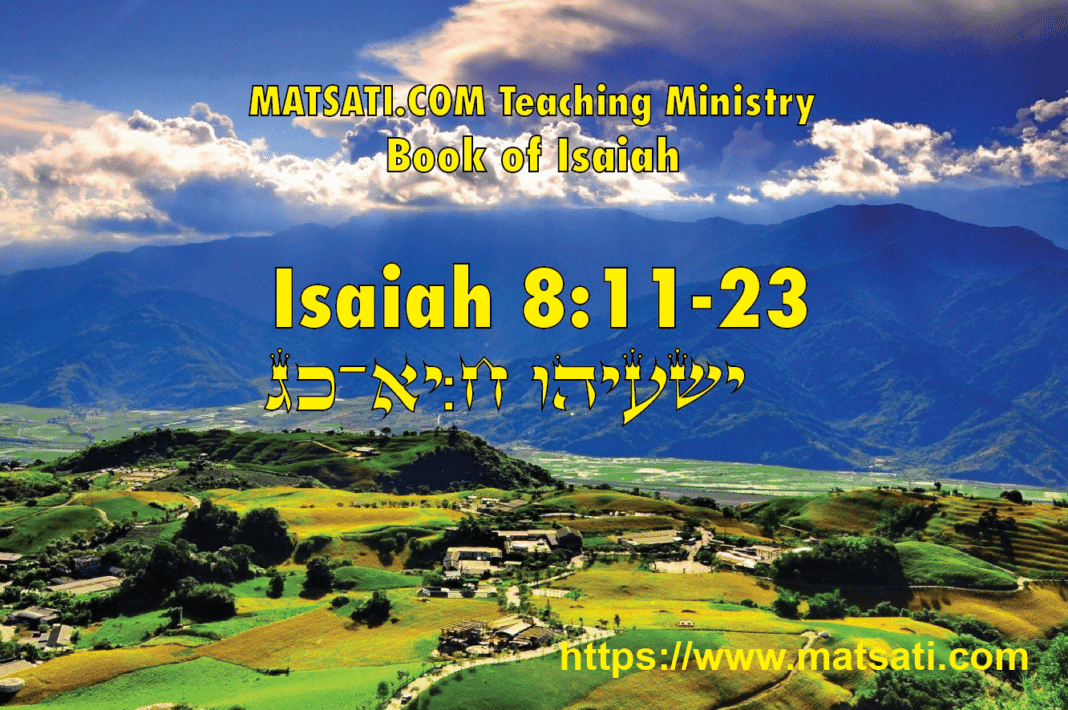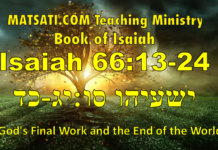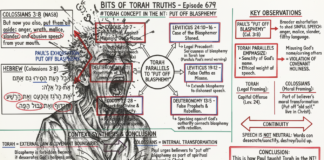Table of Contents
Introduction to Isaiah 8:11-23
Here Isaiah continues with the word of the Lord and a very wise instruction to not walk in the way of these people. The people of Judah and Jerusalem have sought the way of the nations. The imagination of their hearts was always upon their idols. Even in the midst of their troubles, foreign nations are coming against them, which should cause the people to seek the Lord God of Israel but instead they seek foreign gods and divination to learn the future. Isaiah exhorts the people to seek the Lord, His holy word for His revelation and truth, providing a light for their path. Notice the importance and centrality of the Torah in the second half of Isaiah 8. John Oswalt believes the second half of Isaiah 8 is disjointed, pieced together and not all the material was composed at the same time. The major focus and difficulty are to the unity of the entire chapter. This may be due to John not taking a Torah Perspective. Isaiah’s narrative is consistent from a Torah Perspective as we see Isaiah continue saying the following.

ספר ישעיה פרק ח
יא כִּי֩ כֹ֨ה אָמַ֧ר יְהוָ֛ה אֵלַ֖י כְּחֶזְקַ֣ת הַיָּ֑ד וְיִסְּרֵ֕נִי מִלֶּ֛כֶת בְּדֶ֥רֶךְ הָֽעָם־הַזֶּ֖ה לֵאמֹֽר׃
Isaiah 8:11 states, “For the Lord spake thus to me with a strong hand, (כִּי֩ כֹ֨ה אָמַ֧ר יְהוָ֛ה אֵלַ֖י כְּחֶזְקַ֣ת הַיָּ֑ד) And instructed me that I should not walk in the way of this people, saying, (וְיִסְּרֵ֕נִי מִלֶּ֛כֶת בְּדֶ֥רֶךְ הָֽעָם־הַזֶּ֖ה לֵאמֹר)” The way Isaiah speaks saying כִּי֩ כֹ֨ה אָמַ֧ר יְהוָ֛ה אֵלַ֖י כְּחֶזְקַ֣ת הַיָּ֑ד “For the Lord spake thus to me with a strong hand” is very reminiscent of the Torah reminding us of Moshe’s words according to Devarim / Deuteronomy 26:8.

ספר דברים פרק כח
ו וַיּוֹצִאֵ֤נוּ יְהוָה֙ מִמִּצְרַ֔יִם בְּיָ֤ד חֲזָקָה֙ וּבִזְרֹ֣עַ נְטוּיָ֔ה וּבְמֹרָ֖א גָּדֹ֑ל וּבְאֹת֖וֹת וּבְמֹפְתִֽים׃
Devarim / Deuteronomy 28:6
So the LORD brought us out of Egypt with a strong hand and powerful arm, with overwhelming terror, and with miraculous signs and wonders. (KJV)
These words of Moshe carry with them the strength of all of the Torah, of the power of God to do all things, and even so to bring a nation (Israel) out from the midst of another nation (Egypt). The power of God is illustrated in the words וּבְמֹרָ֖א גָּדֹ֑ל “great terror / fear” and that Egypt is the example to prove that that plans of the nations will be thwarted and God, Judah, and Jerusalem will be successful. The hand of the Lord, בְּיָ֤ד חֲזָקָה֙ his strong hand indicates that God himself is getting involved. We note that the zakeph gadol brings us to the second clause of the sentence, וְיִסְּרֵ֕נִי מִלֶּ֛כֶת בְּדֶ֥רֶךְ הָֽעָם־הַזֶּ֖ה “And instructed me that I should not walk in the way of this people.” This phrase is also Torah centric instruction, which for those who know the Torah know how often the Lord makes this statement warning to not walk in the way of the nations.

ספר ויקרא פרק יח
ב כְּמַעֲשֵׂ֧ה אֶֽרֶץ־מִצְרַ֛יִם אֲשֶׁ֥ר יְשַׁבְתֶּם־בָּ֖הּ לֹ֣א תַעֲשׂ֑וּ וּכְמַעֲשֵׂ֣ה אֶֽרֶץ־כְּנַ֡עַן אֲשֶׁ֣ר אֲנִי֩ מֵבִ֨יא אֶתְכֶ֥ם שָׁ֙מָּה֙ לֹ֣א תַעֲשׂ֔וּ וּבְחֻקֹּתֵיהֶ֖ם לֹ֥א תֵלֵֽכוּ׃ ׃
Vayikra / Leviticus 18:3
After the doings of the land of Egypt, wherein ye dwelt, shall ye not do: and after the doings of the land of Canaan, whither I bring you, shall ye not do: neither shall ye walk in their ordinances. (KJV)
ספר ויקרא פרק יח
כד אַל־תִּֽטַּמְּא֖וּ בְּכָל־אֵ֑לֶּה כִּ֤י בְכָל־אֵ֙לֶּה֙ נִטְמְא֣וּ הַגּוֹיִ֔ם אֲשֶׁר־אֲנִ֥י מְשַׁלֵּ֖חַ מִפְּנֵיכֶֽם׃
Vayikra / Leviticus 18:24
Do not defile yourselves by any of these practices, for by all these things the nations I am driving out before you have defiled themselves.

ספר ויקרא פרק כ
כג וְלֹ֤א תֵֽלְכוּ֙ בְּחֻקֹּ֣ת הַגּ֔וֹי אֲשֶׁר־אֲנִ֥י מְשַׁלֵּ֖חַ מִפְּנֵיכֶ֑ם כִּ֤י אֶת־כָּל־אֵ֙לֶּה֙ עָשׂ֔וּ וָאָקֻ֖ץ בָּֽם׃
Vayikra / Leviticus 20:23
You must not follow the statutes of the nations I am driving out before you. Because they did all these things, I abhorred them.
ספר ירמיה פרק י
ב כֹּה | אָמַר יְהֹוָה אֶל-דֶּרֶךְ הַגּוֹיִם אַל-תִּלְמָדוּ וּמֵאֹתוֹת הַשָּׁמַיִם אַל-תֵּחָתּוּ כִּי-יֵחַתּוּ הַגּוֹיִם מֵהֵמָּה:
Jeremiah 10:2
Thus says the LORD: “Do not learn the way of the Gentiles; Do not be dismayed at the signs of heaven, For the Gentiles are dismayed at them. (KJV)
We note the direct statement to avoid the ways of the nations. It is unlikely that Isaiah was in danger of turning to the way of the nations as opposed to his being given this message to give to the people to remind them of God’s Torah and of the alluring dangers of sin.
ספר ישעיה פרק ח
יב לֹא־תֹאמְר֣וּן קֶ֔שֶׁר לְכֹ֧ל אֲשֶׁר־יֹאמַ֛ר הָעָ֥ם הַזֶּ֖ה קָ֑שֶׁר וְאֶת־מוֹרָא֥וֹ לֹֽא־תִֽירְא֖וּ וְלֹ֥א תַעֲרִֽיצוּ׃ יג אֶת־יְהוָ֥ה צְבָא֖וֹת אֹת֣וֹ תַקְדִּ֑ישׁוּ וְה֥וּא מוֹרַאֲכֶ֖ם וְה֥וּא מַֽעֲרִֽצְכֶֽם׃
Isaiah 8:12 states, “Say ye not, (לֹא־תֹאמְר֣וּן) A confederacy, To all them to whom this people shall say, (קֶ֔שֶׁר לְכֹ֧ל אֲשֶׁר־יֹאמַ֛ר הָעָ֥ם הַזֶּֽה) A confederacy; Neither fear ye their fear, nor be afraid.(קָ֑שֶׁר וְאֶת־מוֹרָא֥וֹ לֹֽא־תִֽירְא֖וּ וְלֹ֥א תַעֲרִֽיצוּ)” Isaiah 8:13 “Sanctify the Lord of hosts himself; (אֶת־יְהוָ֥ה צְבָא֖וֹת אֹת֣וֹ תַקְדִּ֑ישׁוּ) And let him be your fear, (וְה֥וּא מוֹרַאֲכֶ֖ם) and let him be your dread. (וְה֥וּא מַֽעֲרִֽצְכֶֽם׃)” Here in Isaiah 8:12, the word קֶ֔שֶׁר means to “bind together” or “join together,” this is the reason the KJV translates “confederacy.” So, Isaiah is saying, לֹא־תֹאמְר֣וּן קֶ֔שֶׁר לְכֹ֧ל אֲשֶׁר־יֹאמַ֛ר הָעָ֥ם הַזֶּ֖ה קָ֑שֶׁר וְאֶת־מוֹרָא֥וֹ לֹֽא־תִֽירְא֖וּ וְלֹ֥א תַעֲרִֽיצוּ “do not say, join with them, to all of them to whom this people will say, join with them, and his terror, do not be afraid, and not in dread / terrified.” The idea is that we are to seek the Lord, to join with the Lord and His ways. This verse suggests that we are to not be concerned with what is happening around us, but to trust in the Lord. We note Isaiah 8:13 states אֶת־יְהוָ֥ה צְבָא֖וֹת אֹת֣וֹ תַקְדִּ֑ישׁוּ the people are to sanctify the Lord. How does one go about sanctifying God in their lives? We note that Kadash is a root word (קדש) that means to set apart, to distinguish, to sanctify, or to hallow. Kadash designates that which belongs to the sphere of the sacred. So how do we sanctify God in our lives? The Torah actually gives us an example. Remember according to Bamidbar / Numbers 20, Moshe failed to sanctify the Lord at the waters of Meribah. This means that He did not represent God properly before the people of Israel, in the way that God had commanded him to represent him (i.e. speak to the rock instead of striking the rock). Moshe became angry with the people and allowed sin to do something that failed to sanctify the Lord. So, in the people’s time of need, Moshe was supposed to represent the Lord’s compassion and mercy to supply all of their needs, but instead he failed to sanctify the Lord. So, in our present time, how are we to sanctify the Lord in our lives? How are we not sanctifying the Lord in our lives? Is it possible to misrepresent the Lord God today like Moshe did? One way that is a direct misrepresentation of God is through liberal ideologies, mingling the ways of the nations with the things of God. Here Isaiah challenges the people to sanctify the Lord in their lives by references to the Torah. Specifically, he tells the people, וְה֥וּא מוֹרַאֲכֶ֖ם וְה֥וּא מַֽעֲרִֽצְכֶֽם “And let him be your fear and let him be your dread.” The people however rather than leaving control in God’s hands, chose to take control of their own through divination, and as Ahaz did to make a deal with foreign nations and their idol gods as opposed to the God of Israel who is trustworthy and true, failing to sanctify the Lord in every way! We note the commentaries that do not take a Torah perspective, get hung up on the word קֶ֔שֶׁר translating as “conspiracy.” We note that the root word קשר means “to tie, bind, to league together, conspire,” from a Torah perspective makes sense, as opposed to the difficulty of connecting sanctity and conspiracy. When קֶ֔שֶׁר is taken to refer to the joining together, it makes complete sense, from a Torah perspective we are not to join with the nations! Thus, to sanctify God means to live our lives by faith and to demonstrate that faith by our faithfulness to His holy Word!
ספר ישעיה פרק ח
יד וְהָיָ֖ה לְמִקְדָּ֑שׁ וּלְאֶ֣בֶן נֶ֠גֶף וּלְצ֨וּר מִכְשׁ֜וֹל לִשְׁנֵ֨י בָתֵּ֤י יִשְׂרָאֵל֙ לְפַ֣ח וּלְמוֹקֵ֔שׁ לְיוֹשֵׁ֖ב יְרוּשָׁלִָֽם׃ טו וְכָ֥שְׁלוּ בָ֖ם רַבִּ֑ים וְנָפְל֣וּ וְנִשְׁבָּ֔רוּ וְנוֹקְשׁ֖וּ וְנִלְכָּֽדוּ׃
Isaiah 8:14 states, “And he shall be for a sanctuary; (וְהָיָ֖ה לְמִקְדָּ֑שׁ) But for a stone of stumbling (וּלְאֶ֣בֶן נֶ֠גֶף) and for a rock of offense (וּלְצ֨וּר מִכְשׁ֜וֹל) to both the houses of Israel, (לִשְׁנֵ֨י בָתֵּ֤י יִשְׂרָאֵ֔ל) For a gin and for a snare to the inhabitants of Jerusalem. (לְפַ֣ח וּלְמוֹקֵ֔שׁ לְיוֹשֵׁ֖ב יְרוּשָׁלִָֽם)” Isaiah 8:15 “And many among them shall stumble, (וְכָ֥שְׁלוּ בָ֖ם רַבִּ֑ים) and fall, and be broken, And be snared, and be taken. (וְנָפְל֣וּ וְנִשְׁבָּ֔רוּ וְנוֹקְשׁ֖וּ וְנִלְכָּֽדוּ)” Isaiah says וְהָיָ֖ה לְמִקְדָּ֑שׁ “And He will be for a sanctuary” which reminds us of the multitudinous times that David spoke these words of how God is our sanctuary and our resting place! We note that for those who sanctify the Lord, these are those who give God, His Word, and His Messiah a place of importance in their lives. This means that he or she seeks to walk in His ways, to make His word a part of their lives, to change one’s character and to be filled with the peace that only God can give. Those who do not choose to seek the Lord, His Word becomes a צ֨וּר מִכְשׁ֜וֹל “stumbling stone.” Isaiah prophetically sees the future saying וְכָ֥שְׁלוּ בָ֖ם רַבִּ֑ים וְנָפְל֣וּ וְנִשְׁבָּ֔רוּ וְנוֹקְשׁ֖וּ וְנִלְכָּֽדוּ “And many among them shall stumble, and fall, and be broken, And be snared, and be taken.” How often do we see this happening today? Those who refuse to seek the Lord, to make a place for Him in their hearts and their lives, will be faced with an immovable stone over which one stumbles. Only the Lord God in heaven can set a person on the correct path to avoid these stumbling blocks. All we have to do is seek and ask the Lord God of Israel and His Messiah Yeshua to come into our lives, and to be Lord over our lives, and begin studying God’s holy Words and live them each day! The NT account of the Messiah Yeshua, we also know speaks of him as being a stumbling block for many. (See Matthew 21:44, Luke 2:34, and Romans 9:33) These things are all explained according to the Torah from the sense of what Isaiah states in 8:16. Those who choose to sanctify the Lord God of Israel in their lives will take refuge in His truth trusting in Him according to His holy Word. Those who refuse to trust in the Lord will sink into depression and the idolatry of oneself.
ספר ישעיה פרק ח
טז צ֖וֹר תְּעוּדָ֑ה חֲת֥וֹם תּוֹרָ֖ה בְּלִמֻּדָֽי׃
Isaiah 8:16 states, “Bind up the testimony, (צ֖וֹר תְּעוּדָ֑ה) seal the law among my disciples. (חֲת֥וֹם תּוֹרָ֖ה בְּלִמֻּדָֽי)” Note the significance of bearing the testimony of God in our lives! Here the Torah is called the testimony of God. The Torah bears this purpose because it speaks of the goodness of God, His power, His holiness, His grace and mercy, His wisdom, and His justice. The people of God are called to bear God’s testimonies in their lives, as proving the faithfulness of His people, as leading to repentance and forgiveness, as being applied to our lives for truth, righteousness, and holiness, and as being a representative. The weightiness of these things speaks to our being a treasured people for those who bear God’s testimonies, having knowledge of God’s great mercy and grace, being the object and affection of God’s love, having the Word of God as a light unto our feet, and exemplifying the testimonies in the daily life and practice of His people. These things exemplify the importance of God’s Torah in the lives of His people. This is not an out-of-date book, but one of utmost importance for the people of God regardless of race or people! We note the word בְּלִמֻּדָֽי comes from the root word למד meaning “to learn, to teach, to be instructed” and so this speaks to the learned ones, which is why the KJV translates as “disciples.” The testimony of God belongs to those who seek the Lord in and through his holy Word, walking in the footsteps of the Messiah Yeshua! We note the various places בְּלִמֻּדָֽי is mentioned in Devarim / Deuteronomy 4:44, 1 Kings 2:3, Nehemiah 9:34, Tehillim / Psalms 78:5/7, and throughout Tehillim / Psalms 119. These verses speak to the instruction of God in terms of the Mitzvot (commands) and Khukim (statutes) as being the revelation of the Lord God Almighty. The idea of bearing the testimony is taking the commands of God and living by them. We also note the NT explanation that it is only with God’s help, with the intimacy of the indwelling of His Holy Spirit are we able to walk in God’s commands! Notice how all of these things speak to the need for our dependence upon God for everything! To trust in Him, to rely upon Him, to not fear what is around us but to walk in His ways regardless of what comes our way! Isaiah is challenging the people to do these things, and all peoples who choose to follow the Messiah, the deliverer, challenging us to do the same!
ספר ישעיה פרק ח
יז וְחִכִּ֙יתִי֙ לַיהוָ֔ה הַמַּסְתִּ֥יר פָּנָ֖יו מִבֵּ֣ית יַעֲקֹ֑ב וְקִוֵּ֖יתִֽי־לֽוֹ׃
Isaiah 8:17 states, “And I will wait upon the Lord, (וְחִכִּ֙יתִי֙ לַיהוָ֜ה) That hideth his face from the house of Jacob, (הַמַּסְתִּ֥יר פָּנָ֖יו מִבֵּ֣ית יַעֲקֹ֑ב) And I will look for him. (וְקִוֵּ֖יתִֽי־לֽוֹ)” Here Isaiah saying וְחִכִּ֙יתִי֙ לַיהוָ֜ה describes his approach to faithfulness unto the Lord as waiting for God’s hand to move. This reminds us of Isaiah 40:31.
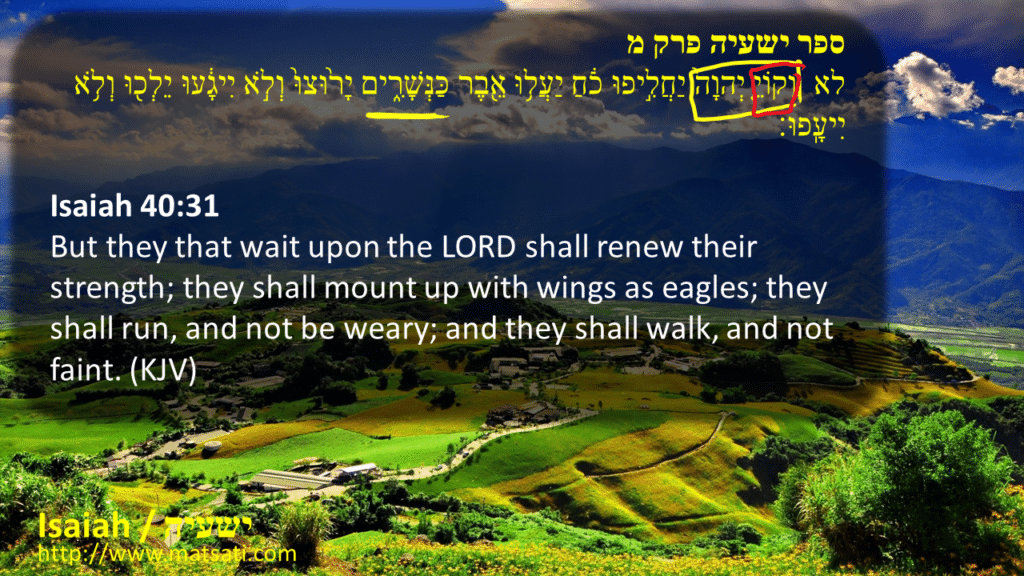
ספר ישעיה פרק מ
לא וְקוֹיֵ֤ יְהוָה֙ יַחֲלִ֣יפוּ כֹ֔חַ יַעֲל֥וּ אֵ֖בֶר כַּנְּשָׁרִ֑ים יָר֙וּצוּ֙ וְלֹ֣א יִיגָ֔עוּ יֵלְכ֖וּ וְלֹ֥א יִיעָֽפוּ׃
Isaiah 40:31
But they that wait upon the LORD shall renew their strength; they shall mount up with wings as eagles; they shall run, and not be weary; and they shall walk, and not faint. (KJV)
We note that Isaiah uses the use of the eagle as a metaphor for strength. (see Shemot / Exodus 19:4, Devarim / Deuteronomy 32:11) Isaiah draws out the fact that God hides his face from Jacob (הַמַּסְתִּ֥יר פָּנָ֖יו מִבֵּ֣ית יַעֲקֹ֑ב) due to the people’s sins. We note that God’s timing is best, which is the purpose of waiting upon the Lord. We note that waiting is humbling ourselves to not seek our own means but to confess our sins and our inability to overcome and wait upon the blessing of the Lord. Consider, without Teshuvah (Repentance), humility, and seeking the Lord, the work of the Lord is hindered. In Isaiah 40:31, the word וְקוֹיֵ֤ is a Qal participle masculine singular meaning “and will wait.” In our verse from Isaiah 8:17 וְחִכִּ֙יתִי֙ piel vayiqatal first person singular meaning “to wait patiently, to be patient, to tarry.” The differences here draw out the faithfulness of the one who does this.
ספר ישעיה פרק ח
יח הִנֵּ֣ה אָנֹכִ֗י וְהַיְלָדִים֙ אֲשֶׁ֣ר נָֽתַן־לִ֣י יְהוָ֔ה לְאֹת֥וֹת וּלְמוֹפְתִ֖ים בְּיִשְׂרָאֵ֑ל מֵעִם֙ יְהוָ֣ה צְבָא֔וֹת הַשֹּׁכֵ֖ן בְּהַ֥ר צִיּֽוֹן׃
Isaiah 8:18 states, “Behold, I and the children whom the Lord hath given me (הִנֵּ֣ה אָנֹכִ֗י וְהַיְלָדִים֙ אֲשֶׁ֣ר נָֽתַן־לִ֣י) Are for signs and for wonders in Israel (יְהוָ֔ה לְאֹת֥וֹת וּלְמוֹפְתִ֖ים בְּיִשְׂרָאֵ֑ל) From the Lord of hosts, which dwelleth in mount Zion. (מֵעִם֙ יְהוָ֣ה צְבָא֔וֹת הַשֹּׁכֵ֖ן בְּהַ֥ר צִיּֽוֹן)” This is a phenomenal statement, here Isaiah states וְהַיְלָדִים֙ אֲשֶׁ֣ר נָֽתַן־לִ֣י יְהוָ֔ה לְאֹת֥וֹת וּלְמוֹפְתִ֖ים בְּיִשְׂרָאֵ֑ל “the children whom the Lord has given me are for signs and wonders in Israel.” It sounds as if Isaiah is drawing the conclusion of his prophetic message to the children which God brings, where children are a blessing from God and a privilege. John Calvin believed that this is a reference to Isaiah’s disciples. Regardless of whether these refer to children or to disciples, these statements indicate that God was working in the midst of His people. Isaiah’s words also remind us of something the author of Hebrews wrote according to Hebrews 2:13.
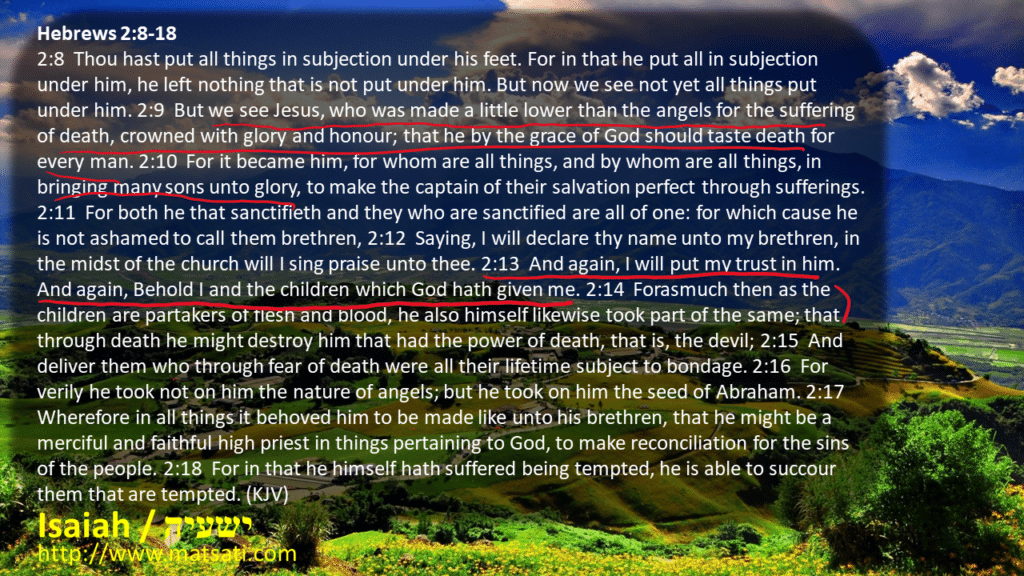
Hebrews 2:8-18
2:8 Thou hast put all things in subjection under his feet. For in that he put all in subjection under him, he left nothing that is not put under him. But now we see not yet all things put under him. 2:9 But we see Jesus, who was made a little lower than the angels for the suffering of death, crowned with glory and honour; that he by the grace of God should taste death for every man. 2:10 For it became him, for whom are all things, and by whom are all things, in bringing many sons unto glory, to make the captain of their salvation perfect through sufferings. 2:11 For both he that sanctifieth and they who are sanctified are all of one: for which cause he is not ashamed to call them brethren, 2:12 Saying, I will declare thy name unto my brethren, in the midst of the church will I sing praise unto thee. 2:13 And again, I will put my trust in him. And again, Behold I and the children which God hath given me. 2:14 Forasmuch then as the children are partakers of flesh and blood, he also himself likewise took part of the same; that through death he might destroy him that had the power of death, that is, the devil; 2:15 And deliver them who through fear of death were all their lifetime subject to bondage. 2:16 For verily he took not on him the nature of angels; but he took on him the seed of Abraham. 2:17 Wherefore in all things it behoved him to be made like unto his brethren, that he might be a merciful and faithful high priest in things pertaining to God, to make reconciliation for the sins of the people. 2:18 For in that he himself hath suffered being tempted, he is able to succour them that are tempted. (KJV)
Note the connection to the Messiah, to suffering and to glory, and stating in Hebrews 2:13 what we read here in Isaiah, saying this is a reference to disciples. Remember how children are a picture of faith and utter trust and reliance upon their parents. This may be where John Calvin obtained his belief about Isaiah 8:18. The Messiah taking on him the seed of Abraham, he appeared in flesh and blood so that he could destroy him that had the power of death, the evil one (2:14) This passage from Hebrews draws from Isaiah messianic king scriptures, and Isaiah’s prophetic words.
ספר ישעיה פרק ח
וט וְכִֽי־יֹאמְר֣וּ אֲלֵיכֶ֗ם דִּרְשׁ֤וּ אֶל־הָאֹבוֹת֙ וְאֶל־הַיִּדְּעֹנִ֔ים הַֽמְצַפְצְפִ֖ים וְהַמַּהְגִּ֑ים הֲלוֹא־עַם֙ אֶל־אֱלֹהָ֣יו יִדְרֹ֔שׁ בְּעַ֥ד הַחַיִּ֖ים אֶל־הַמֵּתִֽים׃
Isaiah 8:19 states, “And when they shall say unto you, (וְכִֽי־יֹאמְר֣וּ אֲלֵיכֶ֗ם) Seek unto them that have familiar spirits, And unto wizards that peep, and that mutter: (דִּרְשׁ֤וּ אֶל־הָאֹבוֹת֙ וְאֶל־הַיִּדְּעֹנִ֔ים הַֽמְצַפְצְפִ֖ים וְהַמַּהְגִּ֑ים) Should not a people seek unto their God? For the living to the dead? (הֲלוֹא־עַם֙ אֶל־אֱלֹהָ֣יו יִדְרֹ֔שׁ בְּעַ֥ד הַחַיִּ֖ים אֶל־הַמֵּתִֽים)” Here is a reference to the Torah, to seek the Lord and not those who have a familiar spirit. (Vayikra / Leviticus 19:31) The culture of the middle eastern peoples, from the time of Ugarit, have been involved in seeking their own means in the midst of uncertainty through divination and unclean spirits. Isaiah says, הֲלוֹא־עַם֙ אֶל־אֱלֹהָ֣יו יִדְרֹ֔שׁ “Should not a people seek unto their God?” as opposed to seeking evil spirits whose only purpose is deception and enslavement. Our God sets us free from bondage, and the intended purpose of the Lord God giving us His commands and His Messiah who overcame all of these things. John Oswalt comments on הֲלוֹא־עַם֙ אֶל־אֱלֹהָ֣יו יִדְרֹ֔שׁ בְּעַ֥ד הַחַיִּ֖ים אֶל־הַמֵּתִֽים speaking of the reasons why Isaiah would discuss the living an the dead (הַחַיִּ֖ים אֶל־הַמֵּתִֽים) with their gods this may be a reference to ancestor worship? It could be that this phrase בְּעַ֥ד הַחַיִּ֖ים אֶל־הַמֵּתִֽים is a parallel to the living (people) consulting the dead (idolatry).
ספר ישעיה פרק ח
כ לְתוֹרָ֖ה וְלִתְעוּדָ֑ה אִם־לֹ֤א יֹֽאמְרוּ֙ כַּדָּבָ֣ר הַזֶּ֔ה אֲשֶׁ֥ר אֵֽין־ל֖וֹ שָֽׁחַר׃
Isaiah 8:20 states, “To the law and to the testimony: (לְתוֹרָ֖ה וְלִתְעוּדָ֑ה) If they speak not according to this word, It is because there is no light in them. (אִם־לֹ֤א יֹֽאמְרוּ֙ כַּדָּבָ֣ר הַזֶּ֔ה אֲשֶׁ֥ר אֵֽין־ל֖וֹ שָֽׁחַר)” When we look at both Isaiah 8:19 and 8:20, we understand that Isaiah is again drawing upon the Torah. Remember what is written in Devarim / Deuteronomy 30:15-17.
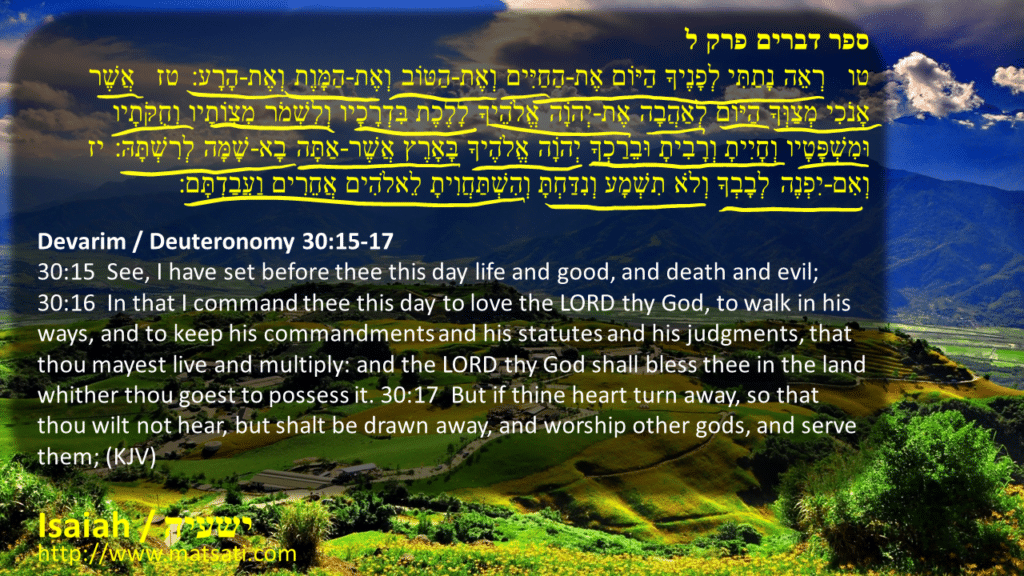
ספר דברים פרק ל
טו רְאֵה נָתַתִּי לְפָנֶיךָ הַיּוֹם אֶת-הַחַיִּים וְאֶת-הַטּוֹב וְאֶת-הַמָּוֶת וְאֶת-הָרָע: טז אֲשֶׁר אָנֹכִי מְצַוְּךָ הַיּוֹם לְאַהֲבָה אֶת-יְהוָֹה אֱלֹהֶיךָ לָלֶכֶת בִּדְרָכָיו וְלִשְׁמֹר מִצְוֹתָיו וְחֻקֹּתָיו וּמִשְׁפָּטָיו וְחָיִיתָ וְרָבִיתָ וּבֵרַכְךָ יְהוָֹה אֱלֹהֶיךָ בָּאָרֶץ אֲשֶׁר-אַתָּה בָא-שָׁמָּה לְרִשְׁתָּהּ: יז וְאִם-יִפְנֶה לְבָבְךָ וְלֹא תִשְׁמָע וְנִדַּחְתָּ וְהִשְׁתַּחֲוִיתָ לֵאלֹהִים אֲחֵרִים וַעֲבַדְתָּם:
Devarim / Deuteronomy 30:15-17
30:15 See, I have set before thee this day life and good, and death and evil; 30:16 In that I command thee this day to love the LORD thy God, to walk in his ways, and to keep his commandments and his statutes and his judgments, that thou mayest live and multiply: and the LORD thy God shall bless thee in the land whither thou goest to possess it. 30:17 But if thine heart turn away, so that thou wilt not hear, but shalt be drawn away, and worship other gods, and serve them; (KJV)
Consider what is being said here, the לְתוֹרָ֖ה וְלִתְעוּדָ֑ה “to the Torah and to the testimony,” this is what we find in the Torah, life and death, whether one is willing to walk in God’s holy, righteous, and true ways, or serving idols, and worshiping other gods. For some reason modern theologies teach that the Torah has passed away, but these things do however remain true for us today! The prophet Isaiah speaks of the Torah and the testimony of God in the lives of Judah and Jerusalem. He says, אִם־לֹ֤א יֹֽאמְרוּ֙ כַּדָּבָ֣ר הַזֶּ֔ה אֲשֶׁ֥ר אֵֽין־ל֖וֹ שָֽׁחַר “If they speak not according to this word, it is because there is no light in them.” Remember also how the light is paralleled to the righteousness of God. We again note how significant the Torah is in the life of God’s people. Much of the NT text references the Torah over and over again, what more reason to study the Torah, as today God’s people need to hear the words of Moshe and the Messiah, just as Isaiah is coupling these things together in his message to Judah and Jerusalem. When one distances his or herself from the Torah, the end result is death. The point is if these words are true, if one fails to live by them, one is seeking death rather than life!
ספר ישעיה פרק ח
כא וְעָ֥בַר בָּ֖הּ נִקְשֶׁ֣ה וְרָעֵ֑ב וְהָיָ֨ה כִֽי־יִרְעַ֜ב וְהִתְקַצַּ֗ף וְקִלֵּ֧ל בְּמַלְכּ֛וֹ וּבֵאלֹהָ֖יו וּפָנָ֥ה לְמָֽעְלָה׃ כב וְאֶל־אֶ֖רֶץ יַבִּ֑יט וְהִנֵּ֨ה צָרָ֤ה וַחֲשֵׁכָה֙ מְע֣וּף צוּקָ֔ה וַאֲפֵלָ֖ה מְנֻדָּֽח׃
Isaiah 8:21 states, “And they shall pass through it, hardly bestead and hungry: (וְעָ֥בַר בָּ֖הּ נִקְשֶׁ֣ה וְרָעֵ֑ב) And it shall come to pass, that when they shall be hungry, they shall fret themselves, (וְהָיָ֨ה כִֽי־יִרְעַ֜ב וְהִתְקַצַּ֗ף) And curse their king and their God, and look upward. (וְקִלֵּ֧ל בְּמַלְכּ֛וֹ וּבֵאלֹהָ֖יו וּפָנָ֥ה לְמָֽעְלָה)” Isaiah 8:22, “And they shall look unto the earth; (וְאֶל־אֶ֖רֶץ יַבִּ֑יט) And behold trouble and darkness, dimness of anguish; And they shall be driven to darkness. (וְהִנֵּ֨ה צָרָ֤ה וַחֲשֵׁכָה֙ מְע֣וּף צוּקָ֔ה וַאֲפֵלָ֖ה מְנֻדָּֽח)” We note that there is both a physical and a spiritual aspect to Isaiah’s words here in Isaiah 8:21. Being hungry, unsatisfied, can have a parallel to not hearing or studying the Word of God. This then can lead to Isaiah 8:21, וְקִלֵּ֧ל בְּמַלְכּ֛וֹ וּבֵאלֹהָ֖יו cursing both king and God. On the other hand, in the Torah specifically from Devarim / Deuteronomy 30:15-17, turning to other gods leads to losing the blessing of God and consequently losing all that one has, farms, food, home, finances, etc. Not trusting in the Lord leads to the loss of health, life, and livelihood. The end result, not knowing the Lord, walking away from His ways, one blames God when all along it was a person’s own fault for not trusting and seeking God in heaven. The main point of Isaiah’s Words here from a Torah perspective is of their lack of God’s Word in their lives which lead to hollow, empty, and dark personalities and lives. These things lead to ignorance and continue walking in the way of the world, bringing the curse upon oneself because he or she has turned from the love of God and from His Messiah! This then is all that they have left, וְאֶל־אֶ֖רֶץ יַבִּ֑יט וְהִנֵּ֨ה צָרָ֤ה וַחֲשֵׁכָה֙ מְע֣וּף צוּקָ֔ה וַאֲפֵלָ֖ה מְנֻדָּֽח “they shall look unto the earth; And behold trouble and darkness, dimness of anguish; And they shall be driven to darkness.” There is nothing left but depression, gloom, and anguish, the earthly problems that plague those who are all about themselves being slaves to their wants and desires. These are the things that The God of Israel wants to set us free from! These are the reasons why the Lord God Almighty sent His Son Yeshua to die for us, to overcome this world, and to help us to overcome too! Isaiah concludes chapter 8 with the following verses. Note this verse in the English bibles is the opening verse to chapter 9.
ספר ישעיה פרק ח
כג כִּ֣י לֹ֣א מוּעָף֮ לַאֲשֶׁ֣ר מוּצָ֣ק לָהּ֒ כָּעֵ֣ת הָרִאשׁ֗וֹן הֵקַ֞ל אַ֤רְצָה זְבֻלוּן֙ וְאַ֣רְצָה נַפְתָּלִ֔י וְהָאַחֲר֖וֹן הִכְבִּ֑יד דֶּ֤רֶךְ הַיָּם֙ עֵ֣בֶר הַיַּרְדֵּ֔ן גְּלִ֖יל הַגּוֹיִֽם׃
Isaiah 8:23/9:1 states, “Nevertheless the dimness shall not be such as was in her vexation, (כִּ֣י לֹ֣א מוּעָף֮ לַאֲשֶׁ֣ר מוּצָ֣ק לָהּ֒) When at the first he lightly afflicted the land of Zebulun and the land of Naphtali, (כָּעֵ֣ת הָרִאשׁ֗וֹן הֵקַ֞ל אַ֤רְצָה זְבֻלוּן֙ וְאַ֣רְצָה נַפְתָּלִ֔י) And afterward did more grievously afflict her by the way of the sea, Beyond Jordan, in Galilee of the nations. (וְהָאַחֲר֖וֹן הִכְבִּ֑יד דֶּ֤רֶךְ הַיָּם֙ עֵ֣בֶר הַיַּרְדֵּ֔ן גְּלִ֖יל הַגּוֹיִֽם)” This last verse from the MSS on Isaiah 8 speaks to the progression of affliction that is sent from the Lord for the purpose of calling us back to Him, to repent, and to seek His ways. We note that this affliction is out of the goodness of God, the kindness of His heart, especially in the idea of the slow progression, small at first, then following greater and greater levels. This physical experience is meant to cause us to come to our senses, to realize our need for the Lord, and our need to Repent. The humbling of Israel here in the northern kingdom, and then the southern kingdom described as Judah and Jerusalem, these things reveal to us the need for our being humble before God, to seek Him and His ways as He is merciful, He is loving, He wants only the best for our lives! This was the whole purpose for giving us His word, and showing us what it means to live a life for Him, and to be free from the bondages of this world. It appears at this point all of Israel, both the northern and southern kingdoms have rebelled against God (Isaiah 8:14) and so the Lord sends His prophets to wake up the nation, to call the nation back to His ways. This is the point of God sending Yeshua the Messiah, whom too was a prophet of God, calling us not just to walk in God’s ways, but to follow in His footsteps as He laid down how it is that we should apply the Torah to our lives, to walk humbly before our God, to love God with all of our heart mind and soul, and to believe in Him as the one who came to save us from our sins!
This is why Isaiah 8:23 is referenced according to Matthew 4:13-17.
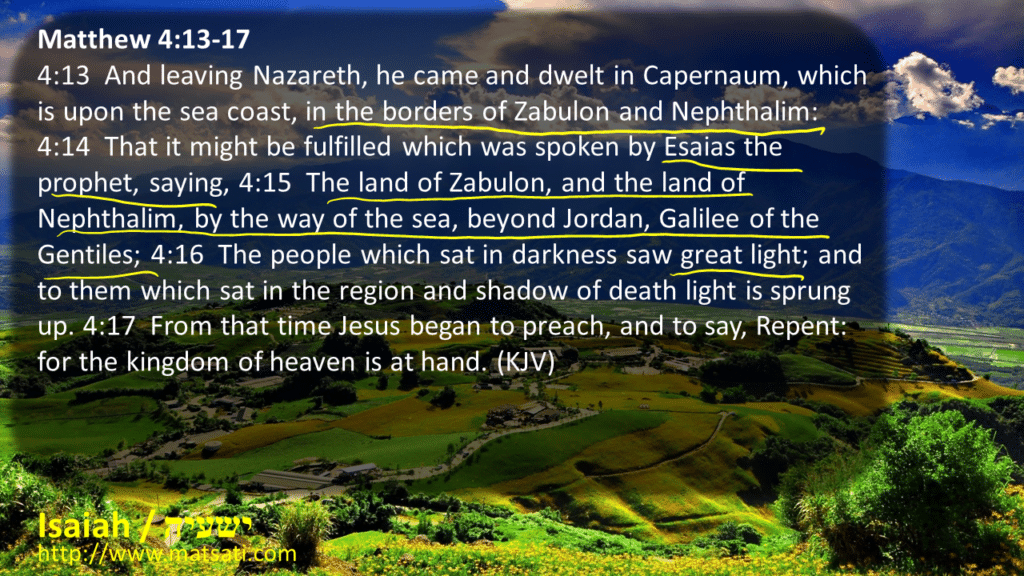
Matthew 4:13-17
4:13 And leaving Nazareth, he came and dwelt in Capernaum, which is upon the sea coast, in the borders of Zabulon and Nephthalim: 4:14 That it might be fulfilled which was spoken by Esaias the prophet, saying, 4:15 The land of Zabulon, and the land of Nephthalim, by the way of the sea, beyond Jordan, Galilee of the Gentiles; 4:16 The people which sat in darkness saw great light; and to them which sat in the region and shadow of death light is sprung up. 4:17 From that time Jesus began to preach, and to say, Repent: for the kingdom of heaven is at hand. (KJV)
The Messiah of God, Yeshua, comes as a great light unto those who are lost, that are illustrated in the Message of Isaiah to the people. The people who sat in darkness, saw a great light, that of the Messiah of God, of His great deliverance and salvation!
Rabbinic Commentary on Isaiah 8:11-23
The Targum Jonathan is an rabbinic translation of the book of Isaiah. TgJ interprets Isaiah in the following way:
תרגום יונתן בן עוזיאל אל ישעיה פרק ח:יא-כג
יא אְרֵי כִדנָן אְמַר יוי לִי כְמִתקַף נְבוּאְתָא וְאַלְפַנִי מִלִמהָך בְאֹורַח עַמָא הָדֵין לְמֵימַר׃ יב לָא תֵימְרוּן מָרֹוד לְכָל דְייֵמַר עַמָא הָדֵין מָרֹוד וּלדַחלְתֵיה לָא תִדחְלוּן וְעַל תוּקפֵיה לָא תֵימְרוּן תַקִיף׃ יג יָת יוי צְבָאֹות יָתֵיה תֵימְרוּן קַדִיש וְהוּא דַחלַתכֹון וְהוּא תֻקפְכֹון׃ יד וְאִם לָא תְקַבְלוּן וִיהֵי מֵימְרֵיה בְכֹון לְפוּרעָן וּלאַבַן מָחֵי וּלכֵיף מַתקַל לִתרֵין בָתֵי רַברְבֵי יִשׂרָאֵל לִתבָר וּלתַקלָא עַל דְאִתפְלִיגוּ בֵית יִשׂרָאֵל עַל דְבֵית יְהוּדָה דְיָתְבִין בִירוּשְלַם׃ טו וְיִתַקלוּן בְהֹון סַגִיאִין וְיִפְלוּן וְיִתַברוּן וְיִתצַדֹון וְיִתאַחְדוּן׃ טז נְבִיָא טַר סָהְדוּתָא לָא תַסהֵיד בְהֹון אְרֵי לָא מְקַבְלִין חְתֹום וְטַמַר אֹורָיתָא לָא צָבַן דְיֵילְפוּן בַה׃ יז אְמַר נְבִייָא עַל דָא צַלִיתִי קֳדָם יוי דַאְמַר לְסַלָקָא שְכִינְתֵיה מִדְבֵית יַעְקֹב וּבעֵיתִי מִן קֳדָמֹוהִי׃ יח הָא עַד דַאְנָא קַייָם וְעוּלֵימַיָא דִיהַב לִי יוי יִתקַייְמוּן בַנָא אָתִין וּמֹופְתִין דַאְמִירִין לְמֵיתֵי עַל יִשׂרָאֵל דְאִם יִחזֹון וִיתוּבוּן תִבטַל גְזֵירְתָא דִגזִירָא עְלֵיהֹון דְיִגלֹון מִלְאִיתַחזָאָה קֳדָם יוי צְבָאֹות דִשכִינְתֵיה בְטוּרָא דְצִיֹון׃ יט וַאְרֵי יֵימְרוּן לְכֹון עַמְמַיָא דְאַתוּן בֵינֵיהֹון תְבַעוּ מִן בִדִין וּמִן זְכוּרוּ דִמנַצְפִין וְדִמנַהְמִין הְלָא כֵין אֹורַח עַמְמַיָא פָלְחֵי טָעְוָתָא עַמָא מִן טָעוּתֵיה תָבְעִין חַיַיָא מִן מִיתַיָא׃ כ כְדֵין תֵימְרוּן לְהֹון לְאֹורָיתָא דְאִתיְהֵיבַת לַנָא לַסָהְדוּ אְנַחנָא שָמְעִין אֵלָא תִגלֹון לְבֵינֵי עַמְמַיָא וְיֵימְרוּן לְכֹון כְפִתגָמָא הָדֵין מִכְעַן לֵית לֵיה מַן דְיַשחַר וְיִבעֹוהִי׃ כא וְיִעדֵי תַקלָא בְאַרעָא וִיהֵי עָקָא וּכפַן וִיהֵי אְרֵי יִחזֵי כְפַן וְסִיגוּף וִילוּט וְיִבזֵי שוּם פַתכְרֵיה וְטָעוּתֵיה וְיִתפְנֵי לְעֵילָא לְמִבעֵי פֻרקָן בָתַר דְתִתחַתַם גְזֵירְתָא וְלָא יִכֹול׃ כב וּסעֵיד מִיָתְבֵי אַרעָא יִבעֵי אְרֵי יֵיתֵי עְלֹוהִי עָקָא כְפַן וְשִלהוּי עָקָא קְבַל וּבִידוּר׃ כג אְרֵי לָא יִשתַלהֵי כָל דְיֵיתֵי לְאַעָקָא לְהֹון כְעִידָן קֳדָמַי גְלֹו עַם אְרַע זְבוּלוּן וְעַם אְרָע נַפתָלִי וּשאָרְהֹון מַלַך תַקִיף יַגלֵי עַל דְלָא אִידְכַרוּ גְבוּרַת יַמָא נִיסֵי יַרדְנָא קְרָב כַרכֵי עַמְמַיָא׃
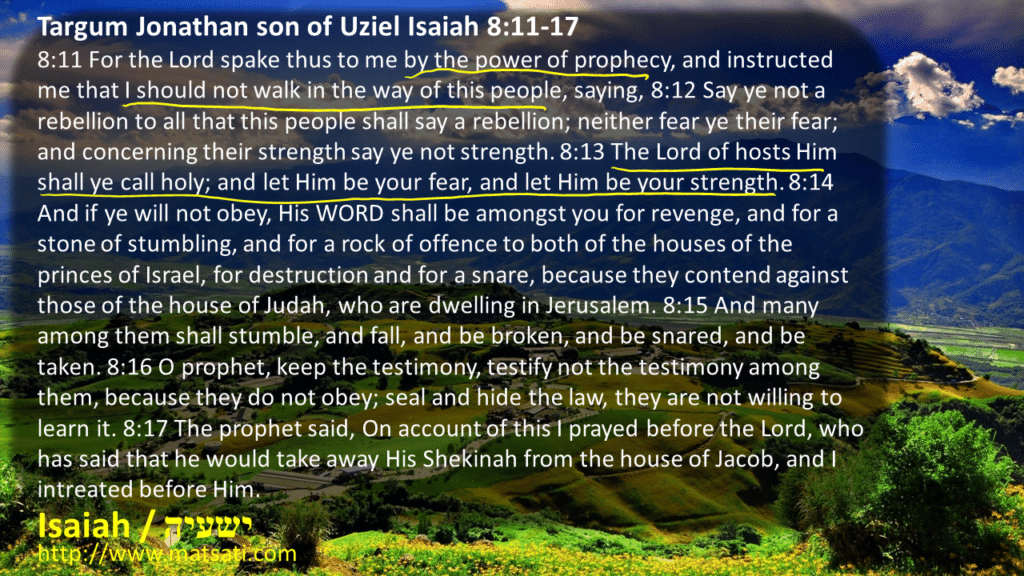
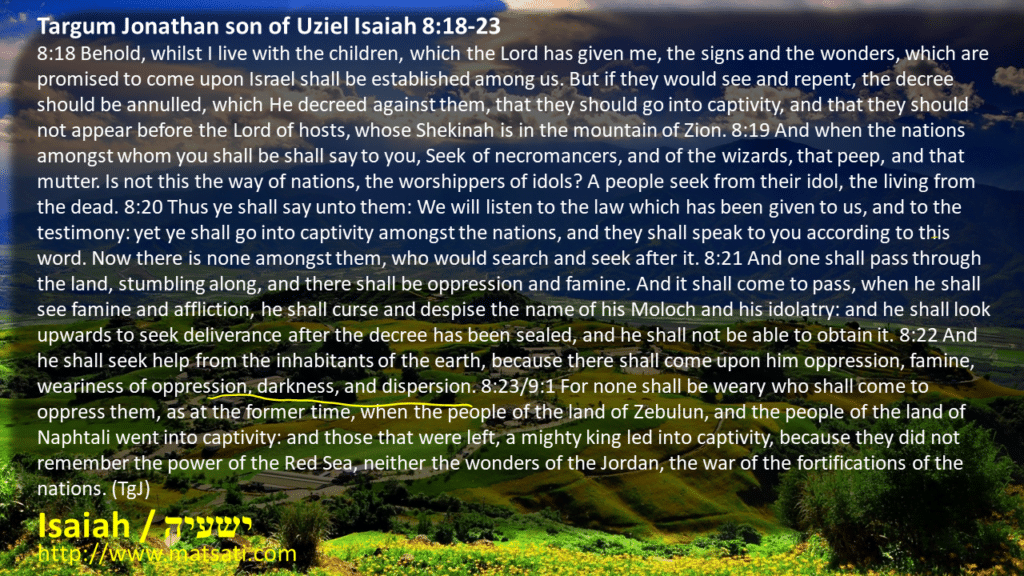
Targum Jonathan son of Uziel Isaiah 8:11-23
8:11 For the Lord spake thus to me by the power of prophecy, and instructed me that I should not walk in the way of this people, saying, 8:12 Say ye not a rebellion to all that this people shall say a rebellion; neither fear ye their fear; and concerning their strength say ye not strength. 8:13 The Lord of hosts Him shall ye call holy; and let Him be your fear, and let Him be your strength. 8:14 And if ye will not obey, His WORD shall be amongst you for revenge, and for a stone of stumbling, and for a rock of offence to both of the houses of the princes of Israel, for destruction and for a snare, because they contend against those of the house of Judah, who are dwelling in Jerusalem. 8:15 And many among them shall stumble, and fall, and be broken, and be snared, and be taken. 8:16 O prophet, keep the testimony, testify not the testimony among them, because they do not obey; seal and hide the law, they are not willing to learn it. 8:17 The prophet said, On account of this I prayed before the Lord, who has said that he would take away His Shekinah from the house of Jacob, and I intreated before Him. 8:18 Behold, whilst I live with the children, which the Lord has given me, the signs and the wonders, which are promised to come upon Israel shall be established among us. But if they would see and repent, the decree should be annulled, which He decreed against them, that they should go into captivity, and that they should not appear before the Lord of hosts, whose Shekinah is in the mountain of Zion. 8:19 And when the nations amongst whom you shall be shall say to you, Seek of necromancers, and of the wizards, that peep, and that mutter. Is not this the way of nations, the worshippers of idols? A people seek from their idol, the living from the dead. 8:20 Thus ye shall say unto them: We will listen to the law which has been given to us, and to the testimony: yet ye shall go into captivity amongst the nations, and they shall speak to you according to this word. Now there is none amongst them, who would search and seek after it. 8:21 And one shall pass through the land, stumbling along, and there shall be oppression and famine. And it shall come to pass, when he shall see famine and affliction, he shall curse and despise the name of his Moloch and his idolatry: and he shall look upwards to seek deliverance after the decree has been sealed, and he shall not be able to obtain it. 8:22 And he shall seek help from the inhabitants of the earth, because there shall come upon him oppression, famine, weariness of oppression, darkness, and dispersion. 8:23/9:1 For none shall be weary who shall come to oppress them, as at the former time, when the people of the land of Zebulun, and the people of the land of Naphtali went into captivity: and those that were left, a mighty king led into captivity, because they did not remember the power of the Red Sea, neither the wonders of the Jordan, the war of the fortifications of the nations. (TgJ)
Isaiah states the following according to the TgJ on Isaiah 8:11, יא אְרֵי כִדנָן אְמַר יוי לִי כְמִתקַף נְבוּאְתָא וְאַלְפַנִי מִלִמהָך בְאֹורַח עַמָא הָדֵין לְמֵימַר׃ 8:11 For the Lord spake thus to me by the power of prophecy, and instructed me that I should not walk in the way of this people, saying (TgJ) As we had mentioned before in the commentary on Isaiah 8:11, God is instruction Isaiah to follow His Torah, to turn from popular culture, to look to His holy and righteous ways, to walk in truth and avoid idolatrous lifestyles and worship. Rashi states the following concerning this verse.
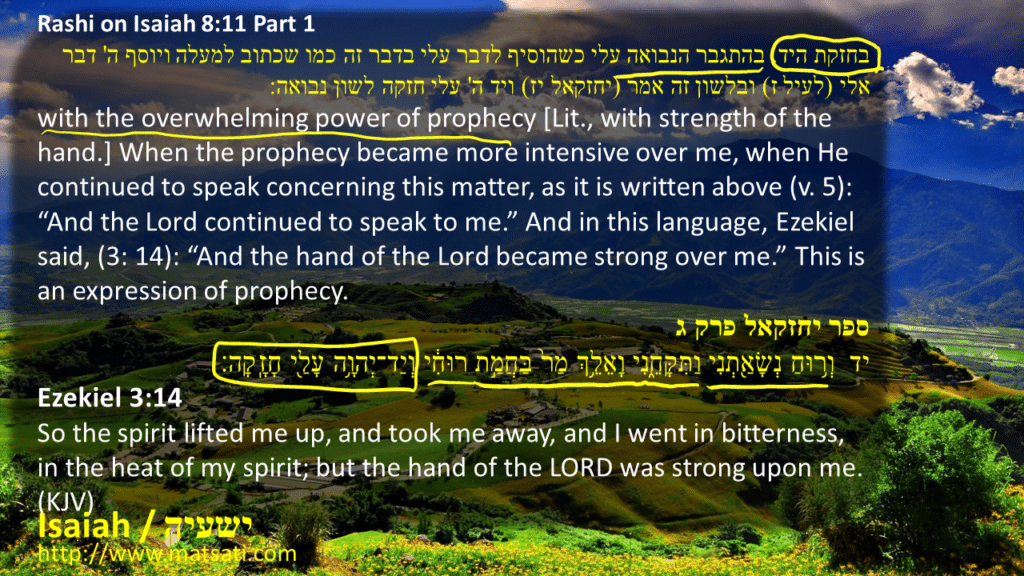
Rashi on Isaiah 8:11 Part 1
בחזקת היד. בהתגבר הנבואה עלי כשהוסיף לדבר עלי בדבר זה כמו שכתוב למעלה ויוסף ה’ דבר אלי (לעיל ז) ובלשון זה אמר (יחזקאל יז) ויד ה’ עלי חזקה לשון נבואה:
with the overwhelming power of prophecy [Lit., with strength of the hand.] When the prophecy became more intensive over me, when He continued to speak concerning this matter, as it is written above (v. 5): “And the Lord continued to speak to me.” And in this language, Ezekiel said, (3: 14): “And the hand of the Lord became strong over me.” This is an expression of prophecy.
Rashi opens his commentary on בחזקת היד. בהתגבר הנבואה “in the strength of the hand, in the strength of prophecy” referring to the hand of God upon the prophet moving him to speak to the people.
ספר יחזקאל פרק ג
יד וְר֥וּחַ נְשָׂאַ֖תְנִי וַתִּקָּחֵ֑נִי וָאֵלֵ֥ךְ מַר֙ בַּחֲמַ֣ת רוּחִ֔י וְיַד־יְהוָ֥ה עָלַ֖י חָזָֽקָה׃
Ezekiel 3:14
So the spirit lifted me up, and took me away, and I went in bitterness, in the heat of my spirit; but the hand of the LORD was strong upon me. (KJV)
Now something to note, It was not the Lord who made Ezekiel bitter in spirit. He was bitter due to the vision he had seen in relation to the sinfulness of the people. This parallels Isaiah’s vision and his confession before God that he is a man of unclean lips (Isaiah 6:5) he was completely undone. The spirit of the Lord never causes one to be bitter or hateful. This is illustrated in the commands of God which offer opportunities for grace as the rabbis say according to the rabbinic literature.
Isaiah continues saying, יב לָא תֵימְרוּן מָרֹוד לְכָל דְייֵמַר עַמָא הָדֵין מָרֹוד וּלדַחלְתֵיה לָא תִדחְלוּן וְעַל תוּקפֵיה לָא תֵימְרוּן תַקִיף׃ 8:12 Say ye not a rebellion to all that this people shall say a rebellion; neither fear ye their fear; and concerning their strength say ye not strength. יג יָת יוי צְבָאֹות יָתֵיה תֵימְרוּן קַדִיש וְהוּא דַחלַתכֹון וְהוּא תֻקפְכֹון׃ 8:13 The Lord of hosts Him shall ye call holy; and let Him be your fear, and let Him be your strength. (TgJ) Comparing to the MSS, we read, יב לֹא־תֹאמְר֣וּן קֶ֔שֶׁר לְכֹ֧ל אֲשֶׁר־יֹאמַ֛ר הָעָ֥ם הַזֶּ֖ה קָ֑שֶׁר וְאֶת־מוֹרָא֥וֹ לֹֽא־תִֽירְא֖וּ וְלֹ֥א תַעֲרִֽיצוּ׃ יג אֶת־יְהוָ֥ה צְבָא֖וֹת אֹת֣וֹ תַקְדִּ֑ישׁוּ וְה֥וּא מוֹרַאֲכֶ֖ם וְה֥וּא מַֽעֲרִֽצְכֶֽם׃ Isaiah 8:12 “Say ye not, (לֹא־תֹאמְר֣וּן) A confederacy, To all them to whom this people shall say, (קֶ֔שֶׁר לְכֹ֧ל אֲשֶׁר־יֹאמַ֛ר הָעָ֥ם הַזֶּֽה) A confederacy; Neither fear ye their fear, nor be afraid.(קָ֑שֶׁר וְאֶת־מוֹרָא֥וֹ לֹֽא־תִֽירְא֖וּ וְלֹ֥א תַעֲרִֽיצוּ)” Isaiah 8:13 “Sanctify the Lord of hosts himself; (אֶת־יְהוָ֥ה צְבָא֖וֹת אֹת֣וֹ תַקְדִּ֑ישׁוּ) And let him be your fear, (וְה֥וּא מוֹרַאֲכֶ֖ם) and let him be your dread. (וְה֥וּא מַֽעֲרִֽצְכֶֽם׃)” The TgJ translates this word קֶ֔שֶׁר as rebellion. This makes sense as the word קֶ֔שֶׁר means to “bind together” or “join together” where the joining with the nations would be equivalent to “rebellion” (מָרֹוד) or to be rebellious. The rabbis of the Talmud state the following concerning these verses.
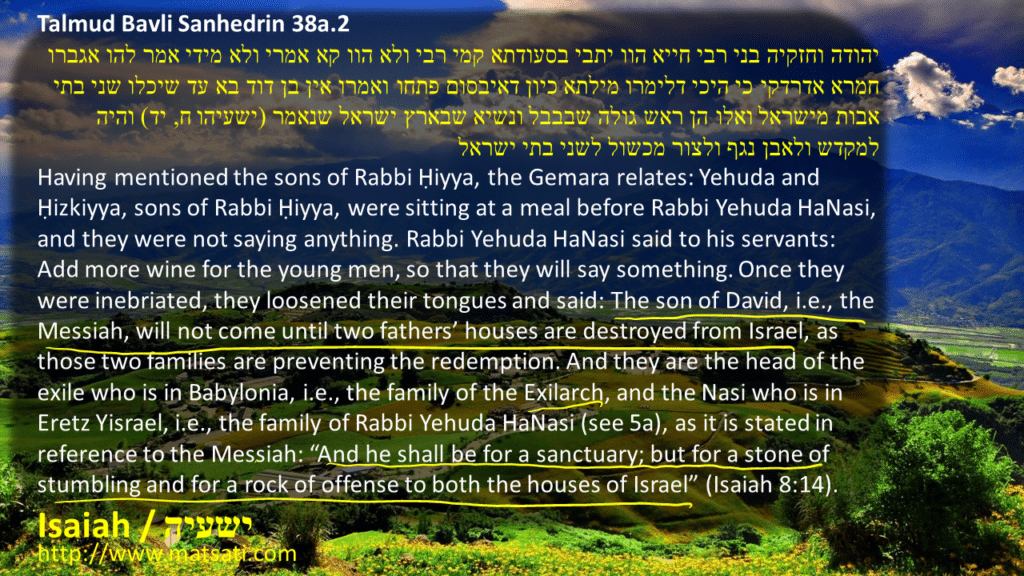
Talmud Bavli Sanhedrin 38a.2
יהודה וחזקיה בני רבי חייא הוו יתבי בסעודתא קמי רבי ולא הוו קא אמרי ולא מידי אמר להו אגברו חמרא אדרדקי כי היכי דלימרו מילתא כיון דאיבסום פתחו ואמרו אין בן דוד בא עד שיכלו שני בתי אבות מישראל ואלו הן ראש גולה שבבבל ונשיא שבארץ ישראל שנאמר (ישעיהו ח, יד) והיה למקדש ולאבן נגף ולצור מכשול לשני בתי ישראל
Having mentioned the sons of Rabbi Ḥiyya, the Gemara relates: Yehuda and Ḥizkiyya, sons of Rabbi Ḥiyya, were sitting at a meal before Rabbi Yehuda HaNasi, and they were not saying anything. Rabbi Yehuda HaNasi said to his servants: Add more wine for the young men, so that they will say something. Once they were inebriated, they loosened their tongues and said: The son of David, i.e., the Messiah, will not come until two fathers’ houses are destroyed from Israel, as those two families are preventing the redemption. And they are the head of the exile who is in Babylonia, i.e., the family of the Exilarch, and the Nasi who is in Eretz Yisrael, i.e., the family of Rabbi Yehuda HaNasi (see 5a), as it is stated in reference to the Messiah: “And he shall be for a sanctuary; but for a stone of stumbling and for a rock of offense to both the houses of Israel” (Isaiah 8:14).
The rabbis speak to the coming of the Messiah, the son of David, that two houses (families) are destroyed from Israel as these families are holding back or preventing the coming of the redemption that comes at the hand of the Messiah. What exactly is it that would cause the coming of the Messiah to be withheld? Further explanation may be gathered from the discussion that continues in the Talmud.
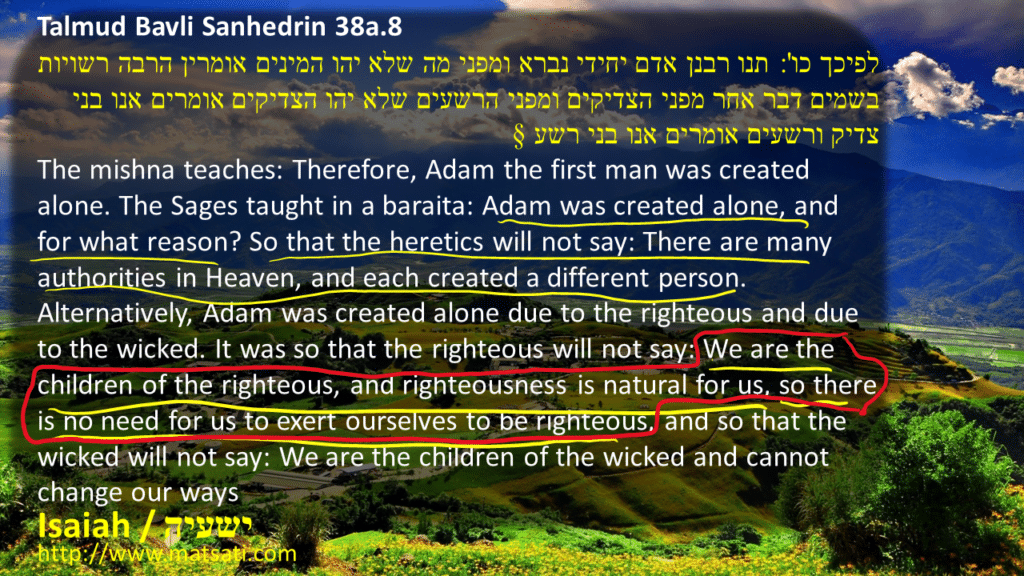
Talmud Bavli Sanhedrin 38a.8
לפיכך כו’: תנו רבנן אדם יחידי נברא ומפני מה שלא יהו המינים אומרין הרבה רשויות בשמים דבר אחר מפני הצדיקים ומפני הרשעים שלא יהו הצדיקים אומרים אנו בני צדיק ורשעים אומרים אנו בני רשע §
The mishna teaches: Therefore, Adam the first man was created alone. The Sages taught in a baraita: Adam was created alone, and for what reason? So that the heretics will not say: There are many authorities in Heaven, and each created a different person. Alternatively, Adam was created alone due to the righteous and due to the wicked. It was so that the righteous will not say: We are the children of the righteous, and righteousness is natural for us, so there is no need for us to exert ourselves to be righteous, and so that the wicked will not say: We are the children of the wicked and cannot change our ways.
What is interesting about this discussion is in regards to the rabbis drawing in the example from the Torah from Adam (from the creation). The point of this discussion is to answer the question why was Adam created alone? The reason was due to the righteous and the wicked. The righteous cannot claim his or her birthright being born from a righteous man, and thus not consider obeying the Torah important. Similar to the wicked as not being able to change their ways, repent, and turn from their sins because of his or her birthright being born from a wicked man. This discussion lays the groundwork for not being able to lay hold of birthright or the deeds of our parents as adding righteousness before God. Remember that the righteous deeds of our parents (i.e. the merit of our fathers) is remembered for the sake of our not being destroyed due to their sins. The same concepts are here in the Isaiah text, of this generation of people, due to their wickedness, they have destroyed future generations, the people are killed by their enemies attacking them. These things connect what we read from the Talmud Bavli Sanhedrin 38a.2. These two families hold back the coming of the Messiah. The theme that Isaiah is giving us based on the previous chapters, these families may be part of the leadership of Judah and Jerusalem. Note that one family was from Israel, the other was from Judah and Jerusalem. The idea here is that if the Messiah had come, then these wicked leaders would assume they were righteous enough for this to happen and then prevent their ability to repent and turn from sin! This is a significant point as God seeks that all men repent and turn from their sins regardless of their birthright. And regardless of one’s birthright, we are all to take upon ourselves the Word of God to live and honor God in their lives!
Isaiah continues saying, יד וְאִם לָא תְקַבְלוּן וִיהֵי מֵימְרֵיה בְכֹון לְפוּרעָן וּלאַבַן מָחֵי וּלכֵיף מַתקַל לִתרֵין בָתֵי רַברְבֵי יִשׂרָאֵל לִתבָר וּלתַקלָא עַל דְאִתפְלִיגוּ בֵית יִשׂרָאֵל עַל דְבֵית יְהוּדָה דְיָתְבִין בִירוּשְלַם׃ 8:14 And if ye will not obey, His WORD shall be amongst you for revenge, and for a stone of stumbling, and for a rock of offence to both of the houses of the princes of Israel, for destruction and for a snare, because they contend against those of the house of Judah, who are dwelling in Jerusalem. טו וְיִתַקלוּן בְהֹון סַגִיאִין וְיִפְלוּן וְיִתַברוּן וְיִתצַדֹון וְיִתאַחְדוּן׃ 8:15 And many among them shall stumble, and fall, and be broken, and be snared, and be taken. טז נְבִיָא טַר סָהְדוּתָא לָא תַסהֵיד בְהֹון אְרֵי לָא מְקַבְלִין חְתֹום וְטַמַר אֹורָיתָא לָא צָבַן דְיֵילְפוּן בַה׃ 8:16 O prophet, keep the testimony, testify not the testimony among them, because they do not obey; seal and hide the law, they are not willing to learn it. (TgJ) Not how obedience to God’s word and failure to listen leads to the word of God becoming a stumbling block from within all of Israel. The TgJ interprets God hiding His face as telling the prophet to hide God’s word from the people because they are unwilling to listen. The Rabbis of the Talmud state the following concerning these verses.
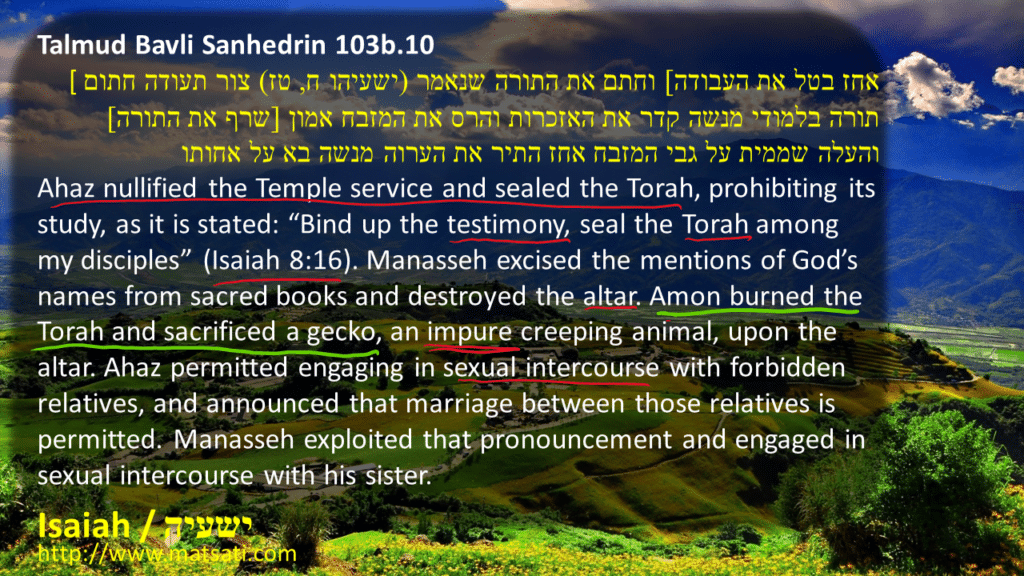
Talmud Bavli Sanhedrin 103b.10
[אחז בטל את העבודה] וחתם את התורה שנאמר (ישעיהו ח, טז) צור תעודה חתום תורה בלמודי מנשה קדר את האזכרות והרס את המזבח אמון [שרף את התורה] והעלה שממית על גבי המזבח אחז התיר את הערוה מנשה בא על אחותו
Ahaz nullified the Temple service and sealed the Torah, prohibiting its study, as it is stated: “Bind up the testimony, seal the Torah among my disciples” (Isaiah 8:16). Manasseh excised the mentions of God’s names from sacred books and destroyed the altar. Amon burned the Torah and sacrificed a gecko, an impure creeping animal, upon the altar. Ahaz permitted engaging in sexual intercourse with forbidden relatives, and announced that marriage between those relatives is permitted. Manasseh exploited that pronouncement and engaged in sexual intercourse with his sister.
Based upon the Targum, the leadership identified as Ahaz stopped the temple service and prohibited the study of God’s word. What this Talmudic tractate reveals to us is what happens to those who leave the word of God. The defiling of what is sacred and engaging in forbidden sexual relations. These things are exactly what is taking place in the sexually deviant society we see today. We note how society continues to go further and further, deeper and deeper into strange and unusual lifestyles and sexual behaviors. These people have no love for heterosexual family, that which God had designed, no respect for parent’s rights, they work to confuse and abuse children mentally and emotionally over their sexuality, to change the way they were created by God and/or groom them for something even worse. This is a satanic culture and is what happens when a people leave the ways of God. Society and culture plunge into satanic anti-Torah behavior and encourage everyone to accept these things as normal. The rabbis continue discussion on these verses according to Midrash Tanchuma Buber, Toldot 1 Part 1.
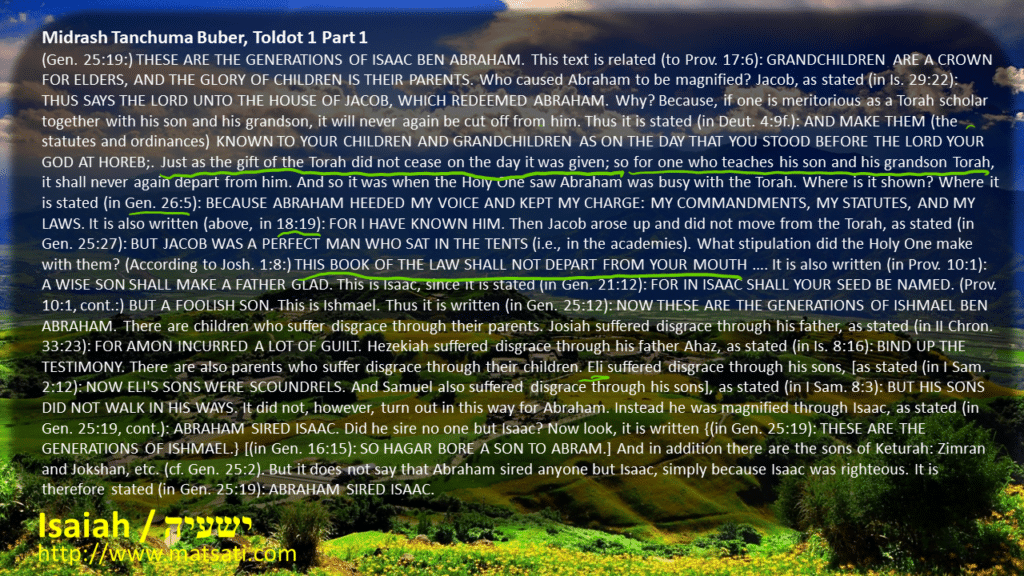
Midrash Tanchuma Buber, Toldot 1 Part 1
ואלה תודלות יצחק בן אברהם (בראשית כה יט). זש”ה עטרת זקנים בני בנים ותפארת בנים אבותם (משלי יז ו), מי גרם לאברהם שנתגדל, יעקב, שנאמר כה אמר ה’ אל בית יעקב אשר פדה את אברהם (ישעיה כט כב), ולמה שאם זכה אדם שיהא בן תורה הוא ובנו ובן בנו, שוב אינה פוסקת ממנו עולמית, שנאמר והודעתם לבניך ולבני בניך יום אשר עמדת (דברים ד י), מה יום מתן תורה אינו בטל, כך הלמד תורה לבנו ובן בנו שוב אינה פוסקת ממנו, וכך כשראה הקב”ה לאברהם שהיה עוסק בתורה, מנין שנאמר עקב אשר שמע אברהם בקולי וגו’ (בראשית כו ה), וכתיב כי ידעתיו (שם יח יט), ועמד יעקב ולא זז מן התורה, שנאמר ויעקב איש תם יושב אוהלים (שם כה כז). מה התנה הקב”ה עמהם, לא ימוש ספר התורה וגו’ (יהושע א ח). וכתיב בן חכם ישמח אב (משלי י א), זה יצחק, שנאמר כי ביצחק יקרא לך זרע (בראשית כא יב), ובן כסיל זה ישמעאל, שנאמר ואלה תולדות ישמעאל בן אברם (שם כה יב). יש בנים מתגנין באבותיהם. יאשיהו מתגנה באביו, שנאמר כי [הוא] אמון הרבה אשמה (דה”ב לג כג). חזקיהו נתגנה באחז, שנאמר צר תעודה (ישעיה ח טז). ויש אבות שנתגנו בבניהם, עלי נתגנה בבניו, [שנאמר ובני עלי בני בליעל (ש”א ב יב), ואף שמואל נתגנה בבניו] שנאמר ולא הלכו בניו בדרכיו (שם ח ג). אלא אברהם לא היה כן, אלא הוא נתגדל ביצחק, שנאמר אברהם הוליד את יצחק, וכי לא הוליד אלא יצחק בלבד, והרי כתיב (ואלה תולדות ישמעאל) [ותלד הגר לאברם בן וגו’ (בראשית טז טו)], ועוד בני קטורה זמרן ויקשן, ואינו אומר אלא אברהם הוליד את יצחק, אלא שהיה יצחק צדיק, לכך נאמר אברהם הוליד את יצחק.
(Gen. 25:19:) THESE ARE THE GENERATIONS OF ISAAC BEN ABRAHAM. This text is related (to Prov. 17:6): GRANDCHILDREN ARE A CROWN FOR ELDERS, AND THE GLORY OF CHILDREN IS THEIR PARENTS. Who caused Abraham to be magnified? Jacob, as stated (in Is. 29:22): THUS SAYS THE LORD UNTO THE HOUSE OF JACOB, WHICH REDEEMED ABRAHAM. Why? Because, if one is meritorious as a Torah scholar together with his son and his grandson, it will never again be cut off from him. Thus it is stated (in Deut. 4:9f.): AND MAKE THEM (the statutes and ordinances) KNOWN TO YOUR CHILDREN AND GRANDCHILDREN AS ON THE DAY THAT YOU STOOD BEFORE THE LORD YOUR GOD AT HOREB;. Just as the gift of the Torah did not cease on the day it was given; so for one who teaches his son and his grandson Torah, it shall never again depart from him. And so it was when the Holy One saw Abraham was busy with the Torah. Where is it shown? Where it is stated (in Gen. 26:5): BECAUSE ABRAHAM HEEDED MY VOICE AND KEPT MY CHARGE: MY COMMANDMENTS, MY STATUTES, AND MY LAWS. It is also written (above, in 18:19): FOR I HAVE KNOWN HIM. Then Jacob arose up and did not move from the Torah, as stated (in Gen. 25:27): BUT JACOB WAS A PERFECT MAN WHO SAT IN THE TENTS (i.e., in the academies). What stipulation did the Holy One make with them? (According to Josh. 1:8:) THIS BOOK OF THE LAW SHALL NOT DEPART FROM YOUR MOUTH …. It is also written (in Prov. 10:1): A WISE SON SHALL MAKE A FATHER GLAD. This is Isaac, since it is stated (in Gen. 21:12): FOR IN ISAAC SHALL YOUR SEED BE NAMED. (Prov. 10:1, cont.:) BUT A FOOLISH SON. This is Ishmael. Thus it is written (in Gen. 25:12): NOW THESE ARE THE GENERATIONS OF ISHMAEL BEN ABRAHAM. There are children who suffer disgrace through their parents. Josiah suffered disgrace through his father, as stated (in II Chron. 33:23): FOR AMON INCURRED A LOT OF GUILT. Hezekiah suffered disgrace through his father Ahaz, as stated (in Is. 8:16): BIND UP THE TESTIMONY. There are also parents who suffer disgrace through their children. Eli suffered disgrace through his sons, [as stated (in I Sam. 2:12): NOW ELI’S SONS WERE SCOUNDRELS. And Samuel also suffered disgrace through his sons], as stated (in I Sam. 8:3): BUT HIS SONS DID NOT WALK IN HIS WAYS. It did not, however, turn out in this way for Abraham. Instead he was magnified through Isaac, as stated (in Gen. 25:19, cont.): ABRAHAM SIRED ISAAC. Did he sire no one but Isaac? Now look, it is written {(in Gen. 25:19): THESE ARE THE GENERATIONS OF ISHMAEL.} [(in Gen. 16:15): SO HAGAR BORE A SON TO ABRAM.] And in addition there are the sons of Keturah: Zimran and Jokshan, etc. (cf. Gen. 25:2). But it does not say that Abraham sired anyone but Isaac, simply because Isaac was righteous. It is therefore stated (in Gen. 25:19): ABRAHAM SIRED ISAAC.
The Midrash reveals to us how children are a blessing from God, therefore children are be taught the Word of God, to raise them in the way of the Lord, and not in the ways of the world which leads to confusion and depression. In this midrash, the rabbis call upon the idea of the Torah being given a Sinai and then it all of a sudden ceasing. The conclusion is that the commands of God never depart from one who is a child of God. Note that the way a child is raised, he will not depart from it. This is a promise in the Scriptures, but the parents also have to live out faith in God being faithful to His holy Word. The Midrash speaks of the sons of various people dishonoring their parents by the way that they choose to live their lives. Abraham was the archetype who was glorified by his son Isaac, and later by his grandson Jacob. The Sons of faith produce much fruit. On the other hand, the son who was the product of a lack of faith (Ishmael) the end result is disgrace to their parents, a rejection of God’s Word, rejection of His covenant, and mingling with the peoples of the world and their idolatrous and unholy ways.
Isaiah continues saying the following, יז אְמַר נְבִייָא עַל דָא צַלִיתִי קֳדָם יוי דַאְמַר לְסַלָקָא שְכִינְתֵיה מִדְבֵית יַעְקֹב וּבעֵיתִי מִן קֳדָמֹוהִי׃ 8:17 The prophet said, On account of this I prayed before the Lord, who has said that he would take away His Shekinah from the house of Jacob, and I entreated before Him. יח הָא עַד דַאְנָא קַייָם וְעוּלֵימַיָא דִיהַב לִי יוי יִתקַייְמוּן בַנָא אָתִין וּמֹופְתִין דַאְמִירִין לְמֵיתֵי עַל יִשׂרָאֵל דְאִם יִחזֹון וִיתוּבוּן תִבטַל גְזֵירְתָא דִגזִירָא עְלֵיהֹון דְיִגלֹון מִלְאִיתַחזָאָה קֳדָם יוי צְבָאֹות דִשכִינְתֵיה בְטוּרָא דְצִיֹון׃ 8:18 Behold, whilst I live with the children, which the Lord has given me, the signs and the wonders, which are promised to come upon Israel shall be established among us. But if they would see and repent, the decree should be annulled, which He decreed against them, that they should go into captivity, and that they should not appear before the Lord of hosts, whose Shekinah is in the mountain of Zion. יט וַאְרֵי יֵימְרוּן לְכֹון עַמְמַיָא דְאַתוּן בֵינֵיהֹון תְבַעוּ מִן בִדִין וּמִן זְכוּרוּ דִמנַצְפִין וְדִמנַהְמִין הְלָא כֵין אֹורַח עַמְמַיָא פָלְחֵי טָעְוָתָא עַמָא מִן טָעוּתֵיה תָבְעִין חַיַיָא מִן מִיתַיָא׃ 8:19 And when the nations amongst whom you shall be shall say to you, Seek of necromancers, and of the wizards, that peep, and that mutter. Is not this the way of nations, the worshippers of idols? A people seek from their idol, the living from the dead. כ כְדֵין תֵימְרוּן לְהֹון לְאֹורָיתָא דְאִתיְהֵיבַת לַנָא לַסָהְדוּ אְנַחנָא שָמְעִין אֵלָא תִגלֹון לְבֵינֵי עַמְמַיָא וְיֵימְרוּן לְכֹון כְפִתגָמָא הָדֵין מִכְעַן לֵית לֵיה מַן דְיַשחַר וְיִבעֹוהִי׃ 8:20 Thus ye shall say unto them: We will listen to the law which has been given to us, and to the testimony: yet ye shall go into captivity amongst the nations, and they shall speak to you according to this word. Now there is none amongst them, who would search and seek after it. (TgJ) In Isaiah 8:17, there is a Torah principle of God dwelling in the midst of His people and of the sin of the people causing the presence of God to leave illustrated by the Lord taking His Shekinah from the house of Jacob. Based upon modern theologies that claim the Torah has passed away, the Torah centric principle of God dwelling in their midst is then analogized to God’s presence being on the outside and not on the inside. The issue however is related to the various cases where God’s presence comes, and men begin to speak prophetically. Examples are taking from the Torah where members in Moses’ camp were surprised to learn that God’s spirit came to rest upon Eldad and Medad who were not in the gathering of the 70 elders, (Bamidbar / Numbers 11:25-29) and just as Joshua wanted Moses to stop Eldad and Medad from prophesying, a request that was not granted, so too we find a similar example according to Mark and Luke’s Gospel John wanted Yeshua to prevent a certain unnamed person from driving out demons. (See Mark 9:38 and Luke 9:49) Eldad and Medad were thought to be “outsiders” which is the same situation for the unnamed “exorcist” according to Mark and Luke. These are just a couple examples. Other examples may be found elsewhere such as Saul in 1 Samuel 10:11, etc. These things reveal to us that God’s Spirit is given freely and stirred up freely, to the surprise of many people who thought they were specially chosen to receive such a wonderful gift. The Word of God closes on a note of warning, just as Isaiah has been saying to Judah and Jerusalem, be on guard against sin lest it become a stumbling block. Rashi writes the following on Isaiah 8:20:
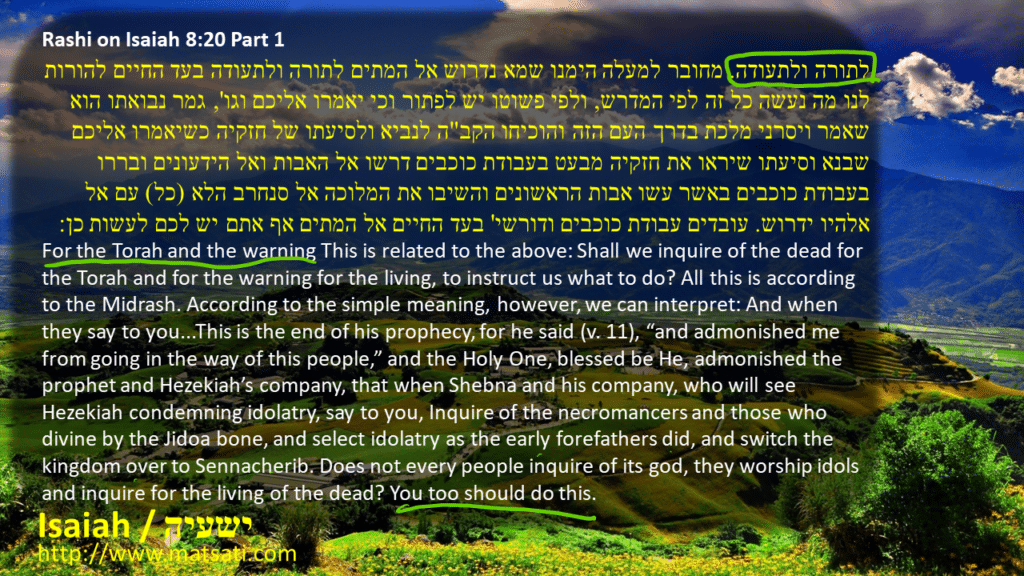
Rashi on Isaiah 8:20 Part 1
לתורה ולתעודה. מחובר למעלה הימנו שמא נדרוש אל המתים לתורה ולתעודה בעד החיים להורות לנו מה נעשה כל זה לפי המדרש, ולפי פשוטו יש לפתור וכי יאמרו אליכם וגו’, גמר נבואתו הוא שאמר ויסרני מלכת בדרך העם הזה והוכיחו הקב”ה לנביא ולסיעתו של חזקיה כשיאמרו אליכם שבנא וסיעתו שיראו את חזקיה מבעט בעבודת כוכבים דרשו אל האבות ואל הידעונים ובררו בעבודת כוכבים באשר עשו אבות הראשונים והשיבו את המלוכה אל סנחרב הלא (כל) עם אל אלהיו ידרוש. עובדים עבודת כוכבים ודורשי’ בעד החיים אל המתים אף אתם יש לכם לעשות כן:
For the Torah and the warning This is related to the above: Shall we inquire of the dead for the Torah and for the warning for the living, to instruct us what to do? All this is according to the Midrash. According to the simple meaning, however, we can interpret: And when they say to you…This is the end of his prophecy, for he said (v. 11), “and admonished me from going in the way of this people,” and the Holy One, blessed be He, admonished the prophet and Hezekiah’s company, that when Shebna and his company, who will see Hezekiah condemning idolatry, say to you, Inquire of the necromancers and those who divine by the Jidoa bone, and select idolatry as the early forefathers did, and switch the kingdom over to Sennacherib. Does not every people inquire of its god, they worship idols and inquire for the living of the dead? You too should do this.
The idea here is to seek the truth from those who are dead. The dead are those who do not know the Lord, living in their wanton desires and teaching others to do the same. The dead are those who do not understand the truth, do not know the Words of God, and do not even recognize sin even when sinning themselves! The dead are those who sin and teach others to do the same, wanting to normalize deviancy. Rashi here appears to be speaking of consulting the dead on behalf of the living using divination and idolatry. This is what happens when a person leaves faith in the Lord to seek out help from elsewhere, as the TgJ writes, כב וּסעֵיד מִיָתְבֵי אַרעָא יִבעֵי אְרֵי יֵיתֵי עְלֹוהִי עָקָא כְפַן וְשִלהוּי עָקָא קְבַל וּבִידוּר׃ 8:22 And he shall seek help from the inhabitants of the earth, because there shall come upon him oppression, famine, weariness of oppression, darkness, and dispersion. (TgJ) The Lord God Almighty however tells us that when man trusts in man and makes the flesh his strength (Jeremiah 17:5-10) he brings a curse upon himself. The point is if we are not continually in the Word of God and seeking to live our lives by faith in faithfulness, these matters of faith do not come to remembrance, similar to what the TgJ states, כג אְרֵי לָא יִשתַלהֵי כָל דְיֵיתֵי לְאַעָקָא לְהֹון כְעִידָן קֳדָמַי גְלֹו עַם אְרַע זְבוּלוּן וְעַם אְרָע נַפתָלִי וּשאָרְהֹון מַלַך תַקִיף יַגלֵי עַל דְלָא אִידְכַרוּ גְבוּרַת יַמָא נִיסֵי יַרדְנָא קְרָב כַרכֵי עַמְמַיָא׃ 8:23/9:1 For none shall be weary who shall come to oppress them, as at the former time, when the people of the land of Zebulun, and the people of the land of Naphtali went into captivity: and those that were left, a mighty king led into captivity, because they did not remember the power of the Red Sea, neither the wonders of the Jordan, the war of the fortifications of the nations. (TgJ) The significance Isaiah chapter 8 is about the need to remain in God’s Word in order to maintain our faith, and to believe in the Deliverer that God has sent, Yeshua the Messiah, for both the forgiveness of sins and the indwelling of God’s presence, a Torah centric principle. In addition, the apostle Paul could not have said it any better when he said that our real battle in this life is not with flesh and blood, but with principalities and powers, which are demons and demonic powers that are at work in the lives of leaders and foreign nations. We must rise up by being intentional in our walk before God, seeking Him and His Messiah, and seeking the righteousness that only God can give through the empowering of the Holy Spirit of God. When we believe in the One who is able to save us, we are able to walk in the power of God in our lives, to overcome anything, and to do battle against our enemies, whether these be demonic forces, demonic ideologies, or simply evil people. We must be active in our relationship with God and not stick our heads in the sand to ignore the work of God in our lives. If we do this, we become distracted by this world allowing the evil one to tear apart our lives and our families! This is how the people of Isaiah’s time behaved, going on with life as if the God of Israel was nonexistent, ignoring His holy Words, and becoming integrated into modern culture of the time. These things lead to the forgetting of God, of His Mercies, and of His promises. What might the end result of those who do these things who say they believe in Yeshua the Messiah but couple doctrines of demons to their faith?
